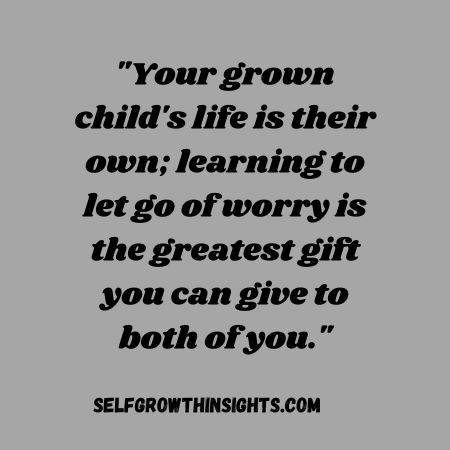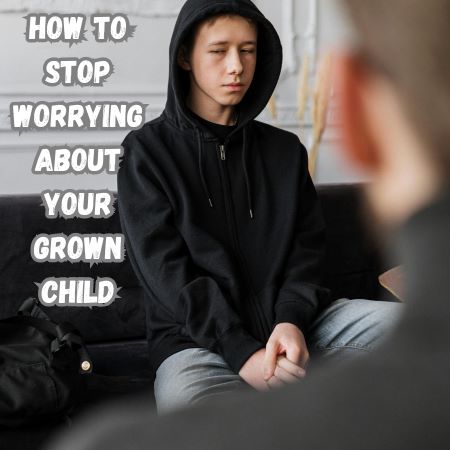As parents, worrying about our children comes naturally, but this concern can become overwhelming as they grow into adulthood. Understanding how to stop worrying about your grown child and manage these worries is essential for both your well-being and the health of your relationship with your grown child. It’s important to recognize that your child is now an adult, capable of making their own decisions and handling life’s challenges.
Understanding Parental Anxiety
Parental anxiety refers to the feelings of worry, unease, or nervousness that parents experience regarding their children’s safety, health, and overall well-being. It’s a natural part of parenting, as parents naturally want to protect their children and ensure they have the best possible outcomes in life. However, when these feelings become overwhelming or interfere with daily functioning, they may need to be addressed. Here are some key aspects of understanding and managing parental anxiety:
- Common Triggers: Anxiety in parents can be triggered by various factors including child’s health, educational pressures, social interactions, safety concerns, and milestones such as starting school or becoming teenagers. External factors like family issues, financial stress, or world events can also heighten anxiety.
- Effects on Parenting: High levels of anxiety can affect parenting styles. Overprotective behaviors, also known as “helicopter parenting,” may stem from anxiety, potentially leading to decreased resilience and independence in children. Conversely, parents might become less engaged if they feel overwhelmed by their anxiety.

Long-term Impacts on Relationships
Long-term impacts of parental anxiety on relationships can be significant, affecting not just the parent-child dynamic but also the overall family atmosphere and the parents’ relationships with each other and with others outside the family. Here’s a deeper look into how parental anxiety can influence these relationships over time:
1. Parent-Child Relationship
Parental anxiety can shape the parent-child relationship in various ways:
- Overprotection: Parents with high anxiety may become overly protective or controlling, fearing for their child’s safety or well-being. This can lead to children feeling less autonomous, potentially stunting their development in terms of self-esteem and independence.
- Attachment Issues: Anxiety can affect the type of attachment a child forms with their parent. Anxious parents might either be overly anxious and reactive or emotionally distant, leading to insecure attachment patterns in children.
- Emotional Responsiveness: Anxious parents might have difficulty managing their emotions, which can affect their ability to respond appropriately to their child’s emotional needs. This could result in the child feeling less supported or understood.
2. Marital/Partner Relationships
The stress and strain of one partner’s anxiety can also affect their romantic relationships:
- Communication Challenges: Anxiety can lead to irritability, tension, and a negative outlook, which can strain communication between partners. This may lead to more conflicts and less effective conflict resolution.
- Emotional Distance: An anxious parent might withdraw emotionally from their partner due to their own worries and stresses, leading to a sense of isolation or loneliness in the relationship.
- Caretaking Dynamics: In some cases, one partner may take on more responsibilities to compensate for the anxious partner’s struggles, which can lead to imbalance and resentment.
3. Social Relationships
Parental anxiety can extend beyond the immediate family, impacting social relationships with friends, extended family, and colleagues:
- Social Withdrawal: Parents dealing with anxiety might avoid social interactions because they feel overwhelmed, which can lead to a smaller support network and feelings of isolation.
- Impact on Social Modeling: Children learn social behaviors from their parents. Anxious parents might model social avoidance or anxious behavior in social settings, which children might then emulate.
4. Inter-Generational Effects
The effects of parental anxiety can be profound enough to pass down to subsequent generations:
- Behavioral Patterns: Children of anxious parents are more likely to develop anxiety or other mental health issues themselves, continuing the cycle.
- Coping Mechanisms: The strategies children learn from their parents to cope with anxiety and stress can persist into adulthood, affecting their future relationships and parenting styles.
Recognizing Your Boundaries
Recognizing and respecting your personal boundaries is essential for maintaining mental and emotional health, fostering healthy relationships, and ensuring overall well-being. Boundaries are the limits and rules we set for ourselves within relationships, which help others understand our needs, preferences, and tolerances. Here’s a guide to recognizing your boundaries:
1. Understanding Different Types of Boundaries
- Emotional Boundaries: Relate to your feelings and how much emotional energy you are willing to share. Setting these boundaries involves recognizing when to say no to demands that are too emotionally draining.
- Physical Boundaries: Pertain to your personal space, physical touch, and privacy. Everyone’s comfort levels differ, and it’s important to communicate where your limits lie.
- Time Boundaries: Involve how you manage your time between work, relationships, and personal activities. Setting clear limits on your time helps prevent burnout and ensures you have time for self-care.
- Intellectual Boundaries: Relate to your thoughts and beliefs. Respecting these boundaries means acknowledging that others may have different views and that discussions should remain respectful.
- Material Boundaries: Concern your possessions and resources. Deciding who can use your belongings and under what circumstances is an important aspect of boundary setting.
2. Identifying Your Personal Boundaries
- Reflect on Past Experiences: Think about times when you felt discomfort, resentment, or frustration in interactions. These feelings can be indicators that your boundaries were crossed.
- Assess Your Values: Understanding what matters most to you can help you establish boundaries that protect these values. If family time is a high priority, you might set boundaries around work hours.
- Listen to Your Body: Often, your body will signal when a boundary is being tested. Tension, discomfort, or anxiety can all be signs that something is off.
3. Communicating Your Boundaries
- Be Clear and Assertive: When expressing your boundaries, be direct and straightforward. Use “I” statements to communicate how specific actions affect you and what you need instead.
- Start Small: If you’re new to setting boundaries, start with smaller, less challenging situations to build your confidence.
- Be Consistent: Consistency is key in boundary setting. Regularly reinforcing your boundaries helps others learn to respect them.
4. Respecting Others’ Boundaries
- Ask Instead of Assume: Just as you want your boundaries to be respected, you should inquire about and respect others’ boundaries.
- Listen Actively: Pay attention to verbal and non-verbal cues that might indicate someone’s boundaries, and adjust your behavior accordingly.
- Apologize if You Cross a Boundary: Recognizing and apologizing for boundary violations can help maintain healthy relationships and mutual respect.

Healthy Boundaries with Adult Children
Establishing healthy boundaries with your adult children is vital to keeping a loving and respectful relationship as your children develop to become independent. As parents, you need to change the way the adult kids interact and acknowledge their autonomy and maturity, and still serving as an example of support and guidance. Here’s how you can establish the right boundaries and keep them
1. Recognize Their Autonomy
- Treat them as adult Be aware that your children who are adults have the ability to make their own choices. Being able to treat them as adults who are independent is vital to their self-esteem and the bond you share with them.
- Respect Your Choices If you disagree with their choice it is essential to respect their right to make these choices. It’s fine to offer advice however it must be done with respect and only when you are asked.
2. Define New Roles
- Change From Manager into Consultant Your job as a parent changes from a manager position to consultant. This means that you can offer assistance and advice when needed instead of supervising or directing the children’s lives.
- Transparent Communication Promote open communication regarding expectations and requirements. This allows both parties to understand the boundaries of each other as well as respecting them.
Promoting Independence
The process of promoting independence among individuals especially young adults requires fostering self-reliance and making talent that benefit them prepare for adulthood. This is vital in building confidence and empowering people to tackle challenges on their own. It involves teaching them to manage their money, make informed choices, and resolve issues by themselves. Instilling independence also means taking a step back and allowing them to feel the effects of their decisions, which is an essential learning tool.
Supporting Their Decisions
Being supportive of someone’s decisions can improve their confidence and increases the ability of them to think independently and take action. It’s crucial to convey confidence in their judgment, which is especially helpful in times of uncertainty. However, being supportive is also about being there to guide and benefit reconsider decisions when they have negative consequences in a manner that is always compassionate and without judgement. This kind of balanced approach will not only improve relationships with others, but also encourages development and self-confidence.
Managing Your Emotions
Controlling the emotions of your life definitely is crucial for your wellbeing as well as competent achievement. Here are some tips to benefit you manage your emotions:
- Recognize and Identify Start by acknowledging your feelings as they manifest. The ability to identify them is an effective way to manage your emotions. It can be as easy as stating “I am feeling frustrated,” or “I am excited.”
- Learn the triggers Try to determine the triggers that cause your emotions. Knowing the actions, situations or individuals that trigger powerful feelings can benefit you formulate responses or to avoid emotional stress.
- Learn Mindfulness Mindfulness is the act of staying focused and in the present moment. It helps you acknowledge and accept your feelings with no judgement. Techniques include meditation, concentrated breathing and exercises to improve your sensory awareness.
- Enhance Emotional Intelligence (EI): EI is the ability to comprehend and manage your own emotions as well as the emotions of other people. Achieving a higher level of EI can result in improved relationships and better decision-making. Think about going to workshops, reading books or working on actively listening and empathy in order to boost the quality of your EI.
- Use healthy Outlets Find positive methods to let out your feelings. It could be through exercising talking to a person you are comfortable with or writing a diary, or taking part in a pastime. Beware of outlets that can hurt your health or the wellbeing of others.
- Take a moment to think before you Take Action Consider taking some time to consider your thoughts before you react to an incident which makes you feel emotionally. This pause will benefit to choose a more positive response instead of reacting in a rash manner.

Mindfulness and Stress Reduction
Mindfulness is a technique of the mind which involves staying conscious and present with the present, conscious of your emotions and thoughts and not judging. The practice has become popular in the field of anxiety reduction since it lets people to be aware of their emotions and thoughts and not be overwhelmed by them.
Benefits of Mindfulness for Stress Reduction
- Improved Self-Awareness Engaging in mindfulness exercises increases your awareness of thoughts and feelings. The self-awareness you collect can benefit you identify stressful thoughts and help manage your thoughts better and more energetically.
- Lower Reactivity Mindfulness helps that you respond to events with calm and clarity rather than reacting with impulsiveness. This could benefit to reduce the severity of the stress response.
- Better mindfulness and Concentration A regular practice of mindfulness could boost your capacity to concentrate and remain focused. This is beneficial both in private and competent environments.
- Emotional Regulators In becoming conscious of your emotional triggers and learning to be aware of your emotions with no judgment, mindfulness will benefit keep your emotions in better well-being.
- Physical Health Benefits The research shows that mindfulness may have physical health benefits, for example decreasing blood pressure and improving sleep quality, both of which can be adversely caused by stress.
Techniques to Practice Mindfulness
- The practice of mindful breathing Focusing your focus on the breath, inhalation, and exhalation. It could benefit keep you focused on the now.
- Body scan The method involves imagining the body for areas where tension is present and deliberately attune your muscles. It assists in establishing a connection between your body and mind as well as alleviate physical tension.
- Mindful Watching: Select one object to focus the entire attention of your. Be observant and not judge it. allow your thoughts on it to pass by. It can benefit in gaining focus and concentration.
- Mindful listening Take note of the sound around you without judgment or labeling the sounds. This technique can benefit you be more in touch with the moment in which you are and decrease the tendency to think in a reactive manner.
- Mindful eating Take note of the texture, taste and the sensations that accompany foods you are eating. It can improve the dining experience as well as promote better relationships with food.
Implementing Mindfulness in Daily Life
The incorporation of mindfulness into everyday life is possible in small easy steps. It’s as simple as taking a couple of minutes every day to practice mindfulness breathing, or setting an appointment for a thorough body scan. As time passes, these routines could become a part of the daily routine of your life, laying the foundation needed for stress-reduction and general health.
It is the most effective method to reduce stress. It assists in cultivating a state of acceptance and awareness and can profoundly influence how we think about and respond to the stressors that are present that we encounter in our daily lives. When one practices mindfulness consistently you can boost your mental, emotional and physical well-being.
Conclusion
Being worried about your adult child is an inevitable element of being a parent, but it is essential to control this stress to safeguard your personal well-being as well as foster an enduring relationship and your kid. When you understand the root cause of anxiety, establishing clearly defined boundaries, encouraging your child’s independence and maintaining an clear and friendly communicationan support your child’s journey into adulthood without overwhelming them—or yourself—with excessive concern.
